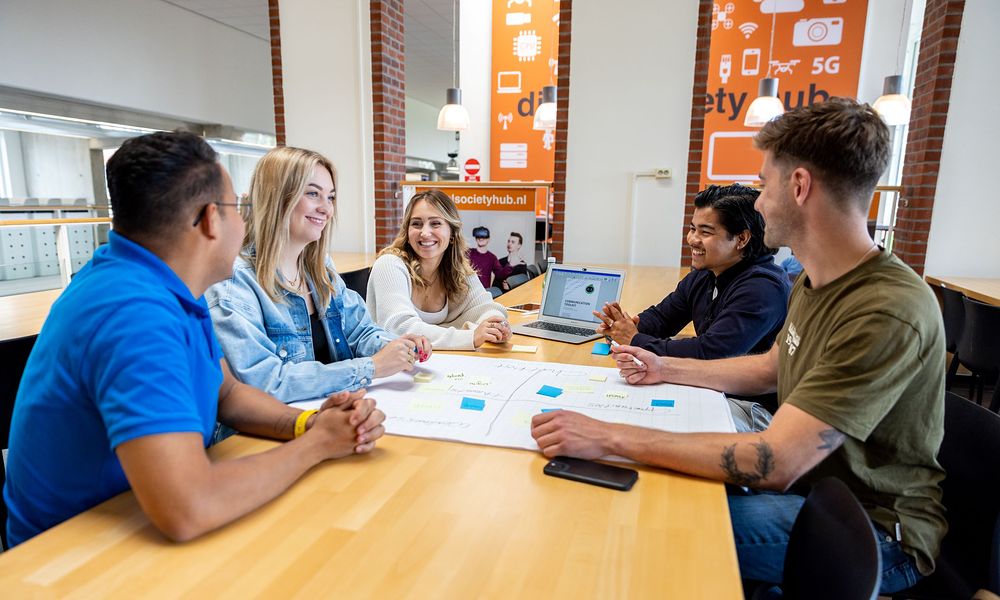The Campaign

The Campaign
- Level
- Language
- English
- Credits
- 30 ECTS
- Startmonths
- Start: September
- Locations
- Groningen
The Campaign is aimed at developing your skills in analysing and creatively solving communication problems by means of a communication campaign. You will learn what an organisational and communication problem is and how you can research such a problem. You will develop a communication campaign for an external client and produce a number of tools (video, printed media and websites) needed to execute this campaign. All this will be done in international project groups, with students coming from all over the world.
About this minor
Developing a communication policy and communication plan requires research to find out what audiences and target groups want. You will set up and carry out a research project using quantitative and qualitative research methods (from communication or marketing research). The research group will gather, select and process information about a formulated communication problem from an outside client. You will analyse the communication aspects of the problem and make a description of the target group in relation to the problem. Your findings will be put down in a written report, meant for the client.
Project Campaign 1
Credits
5
Content
The starting point for companies nowadays in engaging their consumers is understanding their needs and current behaviour in order to involve them, communicate effectively with them and explain the underlying drivers in their behaviour. Marketing communication campaigns are a powerful tool in improving decision-making, changing behaviour and creating engagement among consumers. Authorities, NGOs and businesses that are active in the public domain all try to exercise influence on different kinds of behaviour of people. To change behaviour of people through a campaign is not an easy task. Nevertheless, there are many examples of campaigns that successfully stimulate healthy and responsible behaviour (drinking less alcohol, organ donation). Also with respect to safety in traffic campaigns have contributed to changing behaviour. Communication plays an important role here. As a consultant in communication, you will work on an assignment from a real client who needs help with a communication problem. The assignment is suited for designing a creative (marketing) communication campaign for the client. The campaign is related to sustainability and aimed at behavioural change. You will work in a team in which members mutually inspire each other with ideas, in which networks and expertise are shared and creative techniques are applied to deliver an innovative campaign for your client. You will also learn to create infographics and logos.
Communication- and Research Theory 1
Credits
5
Content
Theories related to campaign development will be discussed. You learn to select relevant theories and at the same time you study and learn to apply design research (orientation and analysis) with the aim of designing a campaign.
Professional Skills 5: Consultancy & Argument
Credits
5
Content
This course focuses on the role and behaviour of the communication consultant with an accent on client orientation interviews in multicultural settings and business report writing. We will also focus on writing an argumentative essay. You will learn how to construct and structure arguments in order to write persuasive texts in preparation for correct argumentation in research reports.
Project Campaign 2
Credits
5
Content
You will work in a team to build a communication campaign with media products for the client, based on research insights and design requirements from the first half of the semester. When building the concept and creating and testing the prototype for the campaign, you will go through the design research process. The campaign has to influence and change the behaviour of the target group. You will present the concept and the final prototype to the client, and also involve the client in the evaluation of the prototype. One of the components of the Project is Visual Communication: you will create animations using After Effects.
Communication and Media Theory 3
Credits
5
Content
You will learn how to make a relevant description of the communication interventions that will be applied in the campaign on the basis of theory and actual cases from the professional field. Before the campaign can be implemented, you will make an estimate of the cost and proposes a budget. You will learn how to use campaigns for the realization of communication goals.
Profesionnal Skills 6: Creation & Oration
Credits
5
Content
This course focuses on copywriting or creating written content for specific international audiences, and presentations of communication products to clients and client interaction with the goal of eliciting feedback and defending own choices. We will also focus on verbal language proficiency via speeches created for and adapted to specific target groups. This includes good preparation, practice in public speaking and building a good structure in argumentation, and attention to English vocabulary, idiom, pronunciation, articulation and intonation, and attitude and body language
Before you can start
This programme is open to exchange students.
For questions about the content of this exchange programme, please contact the coordinator via the ‘Contact & FAQ’ tab above.
Admission & application
Please check with your home university whether there is an agreement set up with the Hanze School that is offering the exchange programme of your choice. To apply for and be admitted for our exchange programme you should take the following steps
-
1. Be nominated by your home university
Once you have been nominated, your nomination will be checked by us and confirmed to your home university by email. You will receive your application link during our application period.
-
2. Submit your online application
Once you have been nominated by your home university you will receive a personal application link and the application instructions during our application period. The application is fully digital and documents do not have to be send by email or postal mail. Make sure you do not miss our application deadline!
-
3. Letter of Acceptance
Once you have submitted your application we will check your documents. If you have to re-submit any documents, we will let you know. We will be sending out Acceptance Letters from the beginning of May when you start in September and from the middle of October when you start in February.
Find out more about our application process and practical matters.
Frequently Asked Questions
Contact
-

Lennart Pruiksma
International Coordinator



